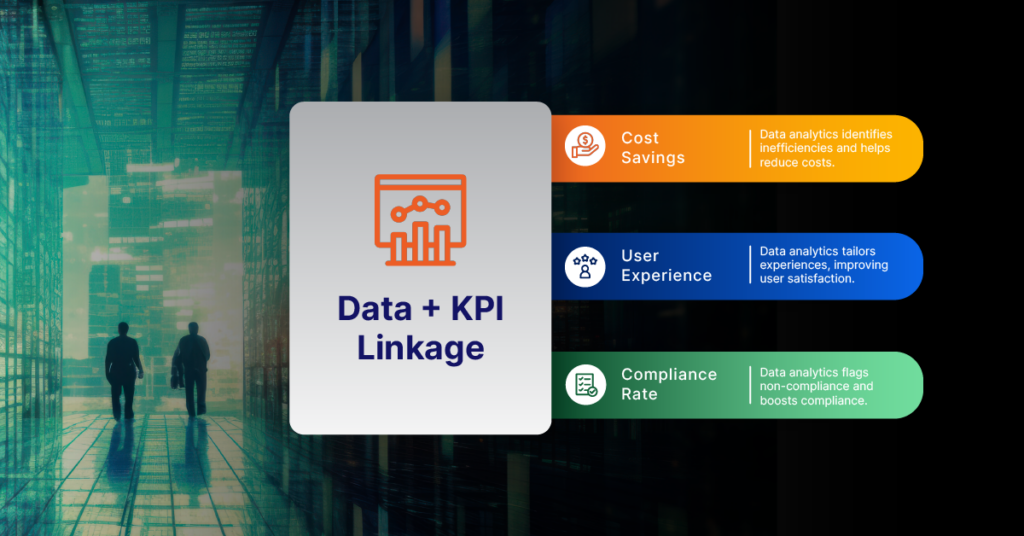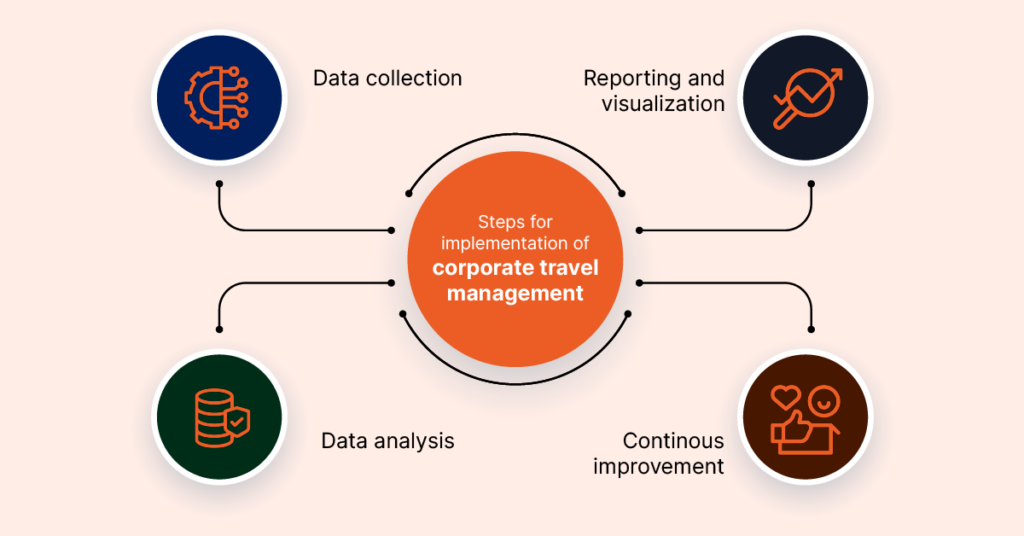
The global business travel industry is rising, with expenditures projected to hit $1316 billion by 2028—nearly double the $700 billion spent in 2020. However, this growth also brings the challenge of managing travel expenses effectively. According to research by the GBTA, business travel spending in the U.S. alone is set to exceed pre-pandemic levels by 7%, which means it will reach around $1.5 trillion this year. Despite this, many organizations are still grappling with optimizing their travel programs.
The data revolution in corporate travel management is not just a game-changer; it’s a financial boon. By leveraging big data, companies can uncover valuable insights into travel patterns. They can also identify cost-saving opportunities and enhance the overall traveler experience. For decision-makers, using this data can show the difference between a well-managed travel program and one that wastes resources.
This blog will delve into the importance of data analytics in travel programs. We will also focus on data and KPI linkage and how to implement data analytics in corporate travel management.
Importance of Data Analytics in Corporate Travel Management
Companies must implement robust data analytics strategies to harness the data revolution in corporate travel management fully. Here are some steps to get started:
Cost Optimization
Cost optimization is one of the most significant benefits of data analytics in travel management. Travel and entertainment expenses often constitute a large portion of a company’s budget. This is where data analytics can help control these costs in several ways:
- Negotiating Better Rates: Data analytics can reveal spending patterns and high-volume routes. This enables companies to negotiate better rates with airlines, hotels, and car rental services. For instance, if data shows significant business travel expenses on specific routes, companies can use this information to secure discounts.
- Identifying Cost Anomalies: By analyzing travel expense data, companies can identify anomalies or irregularities in spending. This includes detecting unusually high expenses for specific trips or identifying outliers in hotel or airfare costs. Addressing these anomalies can lead to substantial savings.
- Policy Compliance: Data analytics tools can monitor compliance with travel policies. This ensures that employees adhere to cost-saving measures such as booking flights in advance or choosing preferred vendors. Companies can flag and address non-compliance promptly, reducing unnecessary expenses.
Traveler Behavior Insights
Understanding traveler behavior is crucial for optimizing corporate travel programs. Data revolution in corporate travel provides detailed insights into how employees travel, their preferences, and their pain points.
- Travel Preferences: Companies can tailor their travel programs by analyzing data on preferred airlines, hotels, and travel routes. This helps in meeting the needs and preferences of their employees. It enhances traveler satisfaction and can lead to better compliance with travel policies.
- Travel Frequency and Patterns: Data analytics can track how often employees travel and identify patterns such as peak travel periods or frequently visited destinations. This information is invaluable for planning purposes and can help negotiate bulk discounts or establish preferred supplier agreements.
- Traveler Feedback: Collecting and analyzing feedback from travelers about their experiences can highlight areas for improvement. For instance, companies can reconsider their partnerships with those vendors if data indicates consistent complaints about a particular airline or hotel.
- Negotiating bulk deals: Data analytics supports deal negotiations by providing insights into market trends, cost-saving opportunities, and supplier performance. This enables travel managers to make informed decisions, optimize terms, and build stronger supplier relationships based on data-driven strategies.
Program Performance Tracking
Corporate travel programs play a crucial role in delivering value to the companies. Hence, it is essential to track employees’ performance using data-driven metrics:
- Key Performance Indicators (KPIs): For program performance tracking, it is important to establish KPIs such as cost per trip, average ticket price, and compliance rates. This allows you to measure the effectiveness of your travel programs. You can regularly monitor these KPIs to ensure the travel program aligns with your company goals and budgets. KPIs are one of the key factors for the data revolution in corporate travel.
- Benchmarking: When you compare your travel program against industry benchmarks, you see how it compares to peers. Data analytics enables your company to benchmark spending, travel policies, and vendor performance against industry standards.
- Return on Investment (ROI): You can calculate your company’s ROI by linking travel data to business outcomes. For instance, with data, you can find out whether the business trip was successful in bagging deals, customer acquisition, and other measurable benefits. This helps you to understand the travel expenses and make an informed decision for future travel.
- Re-booking and Cancellation Trends: Program performance tracking can analyze booking and cancellation data over time to identify trends such as peak cancellation periods, common reasons for re-booking, and patterns in customer behavior. This insight enables businesses to adjust strategies and improve services to reduce cancellations and optimize re-booking rates effectively.
- Revenue Wastage: You can also analyze revenue data to identify patterns of revenue wastage, such as underutilized resources, inefficient pricing strategies, and missed sales opportunities. This analysis helps businesses optimize pricing, streamline operations, and implement targeted marketing efforts to minimize revenue wastage and maximize profitability effectively.
Data + KPI Linkage: Driving Value through Key Metrics
To fully leverage the data revolution in corporate travel, it is essential to understand how data and KPIs (Key Performance Indicators) are linked. Data and KPIs are closely linked in business travel management, which helps in driving performance and efficiency. Your company can collect extensive data on travel expenses, booking patterns, and traveler feedback through an integrated travel management system.

Let us look at some of the core KPIs:
Cost Savings
By setting a KPI for the cost savings in business travel, you can track how effectively it can optimize your travel budgets. Data analytics in travel management plays a crucial role in identifying areas where you can save costs without compromising the quality of travel. For instance, you can analyze historical data that reveals booking flights three weeks in advance leads to a 20% reduction in airfare costs. Implementing this as a policy can lead to significant savings.
You can also save significantly on travel costs by leveraging travel management solutions such as itilite. At itilite, our predictive analytics techniques can help you save travel costs. With our advanced analytics, you can save up to 30% of your company’s total travel costs. You can also leverage our detailed reports to analyze and reduce unnecessary travel spending. Not just that, you can also track your unused credits to ensure more savings.
User Experience
Enhancing travel convenience is essential for improving the overall user experience. Companies can track booking convenience by setting a KPI for their seamless booking system. Data analytics can monitor the efficiency of the booking process, identify any bottlenecks or issues, and provide insights for continuous improvement.
With itilite, you can significantly improve your user experience. itilite Mastermind’s survey feature, you can monitor user activity and gather insights. The user-friendly dashboard of itilite integrates travel policies and preferred vendors, ensuring a hassle-free experience. This leads to higher satisfaction and better compliance with company travel guidelines.
Compliance Rate
Ensuring employees comply with travel policies is essential for cost control and program efficiency. This ensures better data revolution in corporate travel management. A KPI for compliance rate can track how well employees adhere to the company’s travel policies. Data analytics tools can monitor booking patterns and flag non-compliance. For instance, this can be identified and addressed if employees book last-minute flights despite a policy to book at least two weeks in advance. Higher compliance rates lead to more predictable costs and better vendor negotiations.
Enter itilite, an all-in-one travel management solution that helps you manage policy compliance. If your company faces policy violations and wants to minimize overspending on business travel, we can help. Our state-of-the-art features, such as real-time alerts and automated policy enforcement, help companies maintain spending under control.
Use Cases in Implementing Data Analytics in Corporate Travel Management
Companies need to implement robust data analytics strategies to harness the full potential of the data revolution in corporate travel management. Here are some of the use cases to help you understand.
1. Restricting Out-of-Budget Bookings
Many companies face challenges controlling travel expenses when employees frequently make out-of-budget bookings. This can lead to financial strain, budget overruns, and difficulty forecasting and managing expenses effectively. However, by implementing data analytics, you can avoid these issues.
Data analytics helps control travel expenses by analyzing historical spending patterns to identify outliers and understand typical expenditure behaviors. Based on these insights, predictive modeling forecasts future travel costs, allowing for realistic budget allocations and proactive adjustments. Real-time monitoring tools integrated with booking systems provide instant alerts when bookings exceed budget thresholds, enabling timely intervention.
2. Personalizing Hotel and Flight Bookings
One of the challenges that most organizations face is booking hotels and flights according to their employees’ preferences. When hotels and flights do not suit the travelers’ preferences, it can result in employee dissatisfaction. This, in turn leads to reduced productivity due to suboptimal travel arrangements and increased administrative burden.
Data analytics creates detailed traveler profiles by analyzing historical booking data, preferences, feedback, and demographics. These profiles enable personalized recommendation systems powered by machine learning algorithms to suggest tailored travel options aligned with each traveler’s preferences and needs. Continually analyzing traveler feedback refines these recommendations over time, ensuring they remain relevant and accurate.
3. Optimizing Approval Workflows
Some companies lack a structured approval workflow for travel bookings, which results in delays, inconsistencies, and compliance issues. The absence of an efficient approval process can lead to frustration among employees, missed opportunities for cost savings, and difficulties enforcing travel policies.
Data analytics optimizes approval workflows by analyzing historical approval times, identifying bottlenecks, and understanding approval patterns. Automated workflow systems are implemented to streamline the approval process, ensuring requests are routed efficiently, and decisions are made promptly. Real-time dashboards provide visibility into pending approvals, enabling proactive management and reducing delays.

The Impact of the Data Revolution in Corporate Travel Cannot be Underestimated
Adopting data analytics in corporate travel management is no longer a luxury but a necessity for decision-makers. As travel expenses continue to rise, the ability to harness data effectively will be a key differentiator between companies that thrive and those that struggle to manage their travel programs. Embracing the data revolution in corporate travel is the way forward for organizations seeking to achieve cost savings, enhance traveler satisfaction, and ensure the overall success of their travel programs.
Contact itilite now to learn how to leverage data analytics in travel management more seamlessly.













